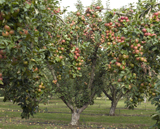Help yourself to apples at RHS Wisley
A bumper harvest of apples has led RHS Wisely to invite members and guests to bring a bag and take home some of the apples in their orchard


RHS Garden Wisley is inviting visitors to ‘forage for free' and help themselves to apples from the orchards to celebrate the superb harvest RHS Garden Wisley has had a bumper harvest of apples this year and is inviting visitors to come and ‘forage for free' in the Orchard and share in the glut of autumn fruit. All members and visitors need to do is bring a bag, turn up between Wednesday 30th October and Sunday 3rd November (10am-4pm) and help themselves for free*. The event is a one off chance to take home some of the 600 different cultivars of apples that are grown at Wisley. These include cultivars like Flower of Kent, which grew in Sir Isaac Newton's garden; Old Pearmain which has been grown in Britain since 1200 AD and the Codling, which is mentioned in Shakespeare. The domestic apple harvest this year has benefitted from near perfect weather conditions. A long cold winter, warm summer and cold autumn nights have combined to produce a large crop with a rosy appearance and superior taste. RHS Garden Wisley stores its apples, holds visitor tastings, picking days and supplies a huge quantity to the onsite restaurant and cafés but this year there have just been too many.
Visitors are invited to take their fill.
*Apples are free, subject to availability. Normal garden entry applies (members free)
* Follow Country Life magazine on Twitter
Sign up for the Country Life Newsletter
Exquisite houses, the beauty of Nature, and how to get the most from your life, straight to your inbox.
-
 380 acres and 90 bedrooms on the £25m private island being sold by one of Britain's top music producers
380 acres and 90 bedrooms on the £25m private island being sold by one of Britain's top music producersStormzy, Rihanna and the Rolling Stones are just a part of the story at Osea Island, a dot on the map in the seas off Essex.
By Lotte Brundle
-
 'A delicious chance to step back in time and bask in the best of Britain': An insider's guide to The Season
'A delicious chance to step back in time and bask in the best of Britain': An insider's guide to The SeasonHere's how to navigate this summer's top events in style, from those who know best.
By Madeleine Silver